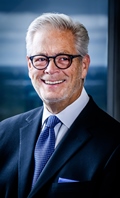 What Will Your Legacy Be? What Will Your Legacy Be?
Becoming a purposeful leader requires knowing your identity
by Mark W. Sheffert
August 2014
"I coach to help boys become men of empathy and integrity who will lead, be responsible and change the world for good." These words define the purpose statement of Joe Ehrmann, a former Syracuse University football All-American and team captain with the Baltimore Colts, who was also featured as “the most important coach in America” by Parade magazine in 2004. Ehrmann was in the Twin Cities to conduct an “InSideOut Coaching” clinic based on his national best-seller. He spoke to over 500 business leaders and Minnesota high school and college coaches to encourage people in leadership positions to become more purposeful and build lasting legacies. I had the opportunity to engage him in some mind-stretching conversation about purpose, identity and legacy.
Ehrmann’s clinic forces participants to look inside themselves and articulate their purpose in coaching and/or leading businesses. He encouraged us to reflect on childhood memories of activities that brought us great joy, at an age before the world taught us what we should be or think or how we should behave. He makes the distinction between "transactional" coaches, who teach their athletes the X's and O's to win games at all costs and "transformational" coaches, who teach young people the "Y's" in life and sport, and equips them with the values and moral courage to win at life.
The exercise made me realize that one of my fondest childhood memories was of fixing broken things. My dad was a traveling salesman and sometimes gone for a couple weeks at a time, and not always available to make repairs. So, as the eldest son, the task fell on my shoulders. When the garage door wouldn’t close or the lawn mower didn’t work, for instance, I would do my best to fix them. Most times, I could figure it out, with much pride. When I couldn’t do it myself, I called my grandfather, who would come over with his old toolbox full of wooden-handled hammers, screwdrivers and other tools, to teach me what to do. This memory made me realize that my life’s purpose was grounded in fixing things, and is probably a driver of my career in business restructurings and turnarounds.
Another childhood memory is not so joyful—report cards. Teachers would write that I didn’t pay attention or daydreamed too often in class. Well, why pay attention to history lessons about the past when you can think about the way things should or could be? Many years later I realized that my “daydreaming” was also a cornerstone of my life’s purpose. I learned that it is actually a unique gift of “intuition,” which over the years has allowed me to counsel organizations on overcoming critical challenges or capitalizing on unique opportunities.
According to Ehrmann, to be transformational in our lives, we must live with a purpose built on helping others. When my time is done on this Earth, I don’t think that people will remember or care about the size of my firm, my bank accounts or my homes or cars; rather, I hope people will say that I was generous. I hope they will say I gave back to people and the community with my time and money to help others achieve their dreams and ideals. I believe what George Bernard Shaw wrote: “Life is not about finding yourself. It’s about creating yourself.”
In his book "All Pro Wisdom—The 7 Choices That Lead to Greatness", former Minnesota Viking star Matt Birk makes the point that we will either establish our own identity, or someone else will do it for us.
A recent "Harvard Business Review" article (“From Purpose to Impact: Figure out your passion and put it to work,” May 2014) reported that less than 20 percent of leaders have a strong sense of their own individual purpose. Now, to be clear, an individual purpose statement is much different from a business mission statement.
A purpose statement describes why you do what you do; it is specific and personal and is about who you are, not who you want to become or think you should be. It can’t be too aspirational, like “promote world peace,” or too jargon-filled, like “empower my team to achieve the necessary outcomes and master new drivers in our market.” Rather, it should be a concise, declarative statement of purpose that defines your values and keeps you going during tough times. In Birk’s book, he challenges readers to consider: What are you about, what do you want to be about and what do you want to stand for? He challenges people to think about what the ideal “you” would look like. Is that the person you see when you look in the mirror?
Joe Ehrmann described his journey to find his purpose, beginning with the death of his brother. Dealing with the grief made him realize how “sports could transcend the playing field,” and led him to find something bigger than himself in sports. That helped him define his purpose statement: “I coach to help boys become men of empathy and integrity who will lead, be responsible and change the world for good. Every practice, drill and game are designed to help fulfill that purpose.”
Business leaders are coaches as well, and can become truly great leaders when they understand that success isn’t about transactions, it’s about equipping the people you are coaching with the tools they need to win at life. It’s about having a purpose greater than the business right in front of you; it’s about leaving a lasting legacy. As Mark Twain said, “The two most important days in your life are the day you are born and the day you find out why.”
Back to Top |



